|
|
|
Sort Order |
|
|
|
Items / Page
|
|
|
|
|
|
|
| Srl | Item |
| 1 |
ID:
136340


|
|
|
|
|
| Summary/Abstract |
“Salafi”, also known as salafiyya, is derived from the Arabic, meaning“the venerable predecessors”, who are the“first three generations of Islam”. In the different interpretations of the Arabic scriptures,“Salafi” evolved gradually into“Doctrinal, Political and Jihad Salafi”.“Jihadist Salafi”, also known as“Salafi Jihadism”or the“Salafi Global Jihad Movement”, by means of falsification of the religious terms in the Koran and Hadith, bewitched its followers with a message of martyrdom for Islam through violence and“Jihad”, eliminated all the heretics, established Islamic political power and restored“true Islam”religiously. Since 2011, a series of terrorist attacks carried out by“Jihadist Salafi”, represented by Jund al-Khilafah in Central Asia, have posed serious threats to regional security. This not only impacts on the anti-extremism policies and anti-extremism policies of Central Asian countries and severely challenges the SCO and CIS, but also poses a significant threat to the security of China’s Northwest.
|
|
|
|
|
|
|
|
|
|
|
|
|
|
|
|
| 2 |
ID:
136845
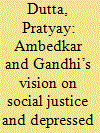

|
|
|
|
|
| Summary/Abstract |
The influence of Babasaheb Ambedkar and Gandhi’s on nationalist India are well-known. They all through their entire life wanted total freedom and upliftment of the Indian masses, i.e., their material and moral advancement. In the pre and post-independence period, Ambedkar divided Indians into two classes, the rich-the upper class and the poor-the lower class.
|
|
|
|
|
|
|
|
|
|
|
|
|
|
|
|
| 3 |
ID:
134902


|
|
|
|
|
| Summary/Abstract |
Between 1820 and 1848, one hundred and forty-eight American Protestant missionaries arrived in the Hawaiian Islands. How did these Americans, eschewing private property and their U.S. homeland, move from devotion to the Hawaiian monarchy to support for U.S. annexation? It is a dramatic story best told from within the confines of household economics: The problems of parenthood and costs associated with raising children. This essay examines the U.S. role in the world through the influence of American families living abroad. In the case of the Hawaiian Islands, the transition of idealistic evangelists to harried parents had intense political ramifications for both the United States and Hawaiian Kingdom, and missionary children would reap the economic fruits of their parents’ labors.
|
|
|
|
|
|
|
|
|
|
|
|
|
|
|
|
| 4 |
ID:
134698


|
|
|
|
|
| Summary/Abstract |
The negotiations to create the U.N. Human Rights Council provided the Chinese government with opportunities to influence the design of the new body. China was unable to gain the necessary support to restrict the introduction of country-specific resolutions, but it received much support elsewhere without needing to use either coercion or inducement
|
|
|
|
|
|
|
|
|
|
|
|
|
|
|
|
| 5 |
ID:
134699
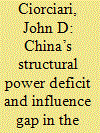

|
|
|
|
|
| Summary/Abstract |
As China rises, its influence on other states’ policy choices will depend partly on the extent of its “structural power.” This article examines China’s role in Asian monetary affairs and argues that deficient structural power has contributed to a significant gap between China’s waxing economic resources and its policy influence.
|
|
|
|
|
|
|
|
|
|
|
|
|
|
|
|
| 6 |
ID:
135294
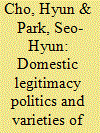

|
|
|
|
|
| Summary/Abstract |
What drives East Asian regionalism? The rise of China and the perceived decline in the influence of the United States have sparked debates about the future of the regional order, including the yet-unresolved question of whose leadership is likely to be more stable and accepted as legitimate by other regional actors. What is puzzling, however, is that persistent demands for the formation of a coherent and uniquely East Asian regional institution have come not from China or the US, as is the focus of existing studies, but rather Japan and South Korea. In this article, we propose an alternative framework that conceptualises the varieties of East Asian regionalism, emphasising the multiple pivots and variegated levels of politics involved in efforts toward regional cooperation. We find that competing proposals for East Asian regionalism since the 1990s are not determined by structural pressures or the convergence of interests but rather result from domestic legitimacy politics. Japanese and Korean leaders have, at different time periods, proposed their own alternative region-making initiatives appealing to domestically contested views on how best to seek autonomy from the region's Great Powers as a way to enhance their political standing domestically and regionally.
|
|
|
|
|
|
|
|
|
|
|
|
|
|
|
|
| 7 |
ID:
136818


|
|
|
|
|
| Summary/Abstract |
This article aims to present the effect of the new alternative energy revolution globally to the traditionally held petro-power and their fading influence in the global political arena, the effect on the export of variants of religious fundamentalism and an array of issues revolving around the OIL politics and diplomacy globally. The paper also presents a way forward for the Indian government to enhance the energy equation and ensure the energy security for the growing Indian economy.
|
|
|
|
|
|
|
|
|
|
|
|
|
|
|
|
| 8 |
ID:
134797


|
|
|
|
|
| Summary/Abstract |
Much ink has been spilled to describe the emergence and likely influence of the Tea Party on the American political landscape. Pundits and journalists declared that the emergence of the Tea Party movement pushed the Republican Party to a more extreme ideological position, which is generally anti-Washington. To test this hypothesis, we analyzed the ideological positions taken by candidates in the 2008 and 2012 pre-Iowa caucus Republican presidential-primary debates. To establish the positions, we used the debate transcripts and a text-analytic technique that placed the candidates on a single dimension. Findings show that, overall, the 2012 candidates moved closer to an anti-Washington ideology—associated with the Tea Party movement—and away from the more traditional social conservative Republican ideology, which was more salient in the 2008 debates. Both Mitt Romney and Ron Paul, the two candidates who ran in both elections, shifted significantly in the ideological direction associated with the Tea Party.
|
|
|
|
|
|
|
|
|
|
|
|
|
|
|
|
| 9 |
ID:
134604


|
|
|
|
|
| Summary/Abstract |
This article examines political exile as a particular form of migration, with reference to Indonesians living in the Union of Soviet Socialist Republics (USSR) when the military regime came to power in their homeland. With the rise in Jakarta of the New Order under Major-General Suharto after 1 October 1965, thousands of Indonesians in socialist and communist states abroad were effectively isolated. Faced with detention or execution if they returned home, Indonesian leftists and other dissidents who were scattered across some dozen states spanning the Sino-Soviet divide became unwilling exiles. Several thousand Indonesians were then studying in the USSR, where they were one of the largest foreign nationalities in Soviet universities and military academies. Many spent nearly half a century as exiles, struggling to survive first the vicissitudes of the cold war and then the global transformations that came with the dissolution of the USSR in December 1991. The most influential grouping of Indonesians who remained in the USSR after 1965 was known as the Overseas Committee of the Indonesian Communist Party. In China, a separate party leadership emerged, known as the Delegation of the Indonesian Communist Party. Mirroring Sino-Soviet rivalries, the Delegation urged Indonesian leftists in the USSR to join them in China. Hundreds did so. These rival factions were separated by mutual distrust until they each disbanded toward the close of the cold war. This article analyzes the changing fate of Indonesians caught in the contradictory relationship between New Order Indonesia and the USSR and in the tensions between the USSR and China as these unwilling exiles were buffeted by geopolitical transformations well beyond their influence.
|
|
|
|
|
|
|
|
|
|
|
|
|
|
|
|
| 10 |
ID:
135935


|
|
|
|
|
| Summary/Abstract |
With Japan viewing Southeast Asia as its natural sphere of influence and a region of immense economic complementarities and potential, it was no surprise that Japan moved quickly in the post-war period to shore up and rebuild its influence in this strategically vital region as the European colonial powers departed from Southeast Asia. Using reparations, followed by aid and trade, Japan soon became a key economic and strategic state actor in Southeast Asia.
Providing a valid counterpoint to communism, Japan proved an attractive economic model that enabled it to grow its influence in the region substantially. Using deft and low-profile diplomacy Japan became an economic leader and driver of economic growth and prosperity in Southeast Asia, supplementing and supporting US Cold War regional objectives. During times of conflict, Japan worked to reduce tensions and restore order using its unique brand of Asian diplomacy, not losing sight of its long-term goal of integrating the region economically and fostering regional peace and stability.
|
|
|
|
|
|
|
|
|
|
|
|
|
|
|
|
| 11 |
ID:
134517


|
|
|
|
|
| Summary/Abstract |
A large body of work points to diverging civil–military views on the initial decision to use force, yet there is little sense if similar differences hold over appropriate conduct in the midst of armed conflict. The rise of international laws governing behavior during war has similarly raised the question of whether these rules can shape the beliefs of various domestic actors. This paper seeks to address both gaps in the literature by leveraging the use of experiments embedded in a pair of US national surveys to examine the impact of international law and military experience on individual attitudes toward torture. The results show veterans are significantly more likely to support torture compared to civilians without any prior military background. International law further reduces civilian support for torture, while veterans are largely unaffected by general legal appeals. However, when facing highly precise rules, or where the threat of punishment is delegated to third parties, more legalized agreements can significantly reduce veteran support for torture. The results have implications for the study of institutional design, the differential effects of legal norms on nonstate actors, and the potential for greater awareness of the laws of war to influence attitudes toward wartime violence.
|
|
|
|
|
|
|
|
|
|
|
|
|
|
|
|
| 12 |
ID:
134697
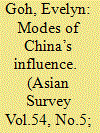

|
|
|
|
|
| Summary/Abstract |
Distinguishing between power as resources and influence as converting those resources into outcomes, I propose a new framework for analyzing China’s influence, using examples from Southeast Asia. Because China exercises influence predominantly in contexts of convergent, not divergent, preferences, three key modes of influence are “preference multiplying,” “persuasion,” and “ability to prevail.”
|
|
|
|
|
|
|
|
|
|
|
|
|
|
|
|
| 13 |
ID:
136719


|
|
|
|
|
| Summary/Abstract |
There has been a perceptible decline in the standards of conduct of the Israeli political class. One major culprit is the Americanization of the Jewish state’s political life.
|
|
|
|
|
|
|
|
|
|
|
|
|
|
|
|
| 14 |
ID:
136371
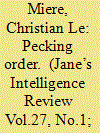

|
|
|
|
|
| Summary/Abstract |
to the Asia-Pacific region have underlined the country’s dominance. Christian Le Miere assesses whether China can tip the balance against the United States political influence
|
|
|
|
|
|
|
|
|
|
|
|
|
|
|
|
| 15 |
ID:
135964


|
|
|
|
|
| Summary/Abstract |
AS IS WELL KNOWN, AMERICANS WITH HIGHER INCOMES tend to be more politically active than lower-income citizens. They vote more often, engage in more political discussions, attend more campaign events, contribute more money, and contact more public officials.1 But research to date has only examined the moderately affluent respondents that surveys of the general public are able to reach: the top 20 percent or 30 percent of income earners. What about really wealthy Americans, with incomes or wealth in the top 1 percent, who might potentially have a great deal of political influence? Do they—as resource-based theories would suggest2—participate at still higher levels than the merely affluent? Do they more often initiate contacts with high-level government officials? If so, about what? Matters of narrow economic self-interest or the common good (as they see it)? Answers to these questions may have implications for the workings of democratic politics.
|
|
|
|
|
|
|
|
|
|
|
|
|
|
|
|
| 16 |
ID:
134484
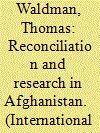

|
|
|
|
|
| Summary/Abstract |
This article examines the evolution of western policy towards the idea of pursuing negotiations with the Taliban, or ‘reconciliation’, in Afghanistan and the role that research and expert opinion played in that process. The official western position has evolved iteratively from initial rejection to near complete embrace of exploring the potential for talks. It is widely assumed that the deteriorating security situation was the sole determinant of this major policy reversal, persuading decision-makers to rethink what had once been deemed unthinkable. Moreover, given the politicized and sensitive nature of the subject, we might expect the potential for outside opinion to influence decision-makers to be low. Nevertheless, this article demonstrates that it would be a mistake to underestimate the role that research and expert knowledge played—the story is more nuanced and complex. Research coalesced, sometimes prominently, with other key drivers to spur and shape policy change. Importantly, it often took experts to make sense of events on the ground, especially where the failure of the military approach was not recognized, understood or palatable to those in official circles. Research interacted with changing events, policy windows, the emergence of new personalities and the actions of various intermediaries to shape emerging positions. More broadly, the case of reconciliation in Afghanistan reveals the difficulties and challenges, but also the variety of opportunities and techniques, for achieving research influence in conflict-affected environments.
|
|
|
|
|
|
|
|
|
|
|
|
|
|
|
|
| 17 |
ID:
136545


|
|
|
|
|
| Summary/Abstract |
China’s weibo community numbered more than 300 million users in 2013. This article assesses the rise and influence of microblogs from political, social, and commercial aspects. It examines ways the Chinese government has controlled microblogs, considers newer competing forms of communication, and assesses trends in Chinese digital discourse.
|
|
|
|
|
|
|
|
|
|
|
|
|
|
|
|
| 18 |
ID:
136329


|
|
|
|
|
| Summary/Abstract |
The emergence of well-positioned middle powers is a profound impetus for change within the international arena of structure rearrangement, issues replacement, and values reconstruction. In particular, India, Brazil, Turkey and South Africa are middle powers that rose together during the global FINANCIAL crisis to become a compelling force, each transitioning to active participant rather than follower.1 As a result, Chinese diplomatic personnel are in a unique position to capitalize on their newly transformed political and economic influence.
|
|
|
|
|
|
|
|
|
|
|
|
|
|
|
|
| 19 |
ID:
134552


|
|
|
|
|
| Summary/Abstract |
Germany would not “divorce” the U.S. to embrace Russia. Still, a monogamous relationship between Washington and Berlin could well be transformed to a peculiar menage a trois, in which Moscow could find its role in sharing influence and possibly even domination in East/Central European space.
|
|
|
|
|
|
|
|
|
|
|
|
|
|
|
|
| 20 |
ID:
136730


|
|
|
|
|
| Summary/Abstract |
The article studies the range of problems that have emerged due to the growing immigration from Muslim countries into the European Union (EU). While describing the functions of immigrants' communities, the authors focus on their political role in the receiving states. The study of the historical development of government–diaspora relations in three cases (the UK, France, and Germany) shows that Muslim communities' political influence does not reflect their economic and cultural role, which in the future might threaten the EU security, unless these countries develop a new approach to an “acculturation” policy.
|
|
|
|
|
|
|
|
|
|
|
|
|
|
|
|
|
|
|
|
|